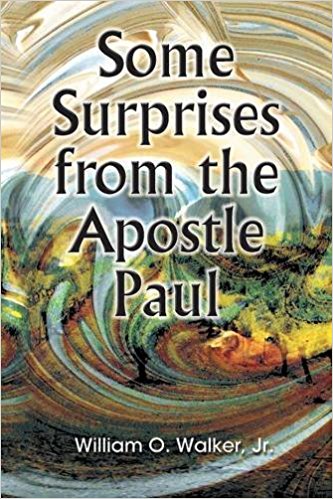I recently drew upon a chapter by William O. Walker, Jr. in Some Surprises From the Apostle Paul to argue for the likelihood of interpolations in Paul’s letters: Why Many Interpolations in Paul’s Letters are Very Likely.
But that was only one late chapter in Walker’s book. Explanation 4 below is another “surprise” he writes about:
Paul on the Historical Jesus
Just one detail: Commenting on the passage in Romans (that some think is an interpolation, by the way!) that Jesus was descended from David, W points out that
“this may be more of a theological affirmation than a historical fact: in the minds of some, the Messiah was supposed to be a “son of David,” so Paul, like some other early Christians, may have simply assumed that because Jesus was the Messiah he must have been descended from David.” (Kindle version, loc ca 384)
Walker points to what most readers here know: that Paul says precious little about the historical Jesus. I won’t address the points that Walker interprets as references to a historical Jesus but will list some of his evaluations of the proposed reasons for Paul’s “relative silence”.
Explanation 1: Paul could presuppose his readers already knew the basic fact of Jesus’ life; no need to repeat what they already knew
W’s objection 1
To say that [Paul] must have talked [previously] about the life and teaching of Jesus really means little more than that [the scholar] himself, if he had been in Paul’s position, would have talked about the life and teaching of Jesus. In other words, [the scholar] thinks Paul should have talked about the life and teaching of Jesus. Be we certainly do not know that Paul did in fact talk about the life and teaching of Jesus when he was present in the churches; he may have, but we do not know this. (loc ca 442)
W’s objection 2
Even when Paul wrote a very lengthy letter to the church at Rome — a church he had never previously personally visited — he still had next to nothing to say about the life and teaching of Jesus.
W’s objection 3
Paul could assume that his readers already knew about the death, resurrection and expected parousia of Jesus, yet he talks a great deal about these, especially his death and resurrection.
W’s objection 4
Many times (e.g. eating meat sacrificed to idols, importance of love, not seeking vengeance, not judging one another) an appeal to a teaching of Jesus could have bolstered his own argument.
who was conceived by the Holy Spirit,
born of the Virgin Mary,
suffered under Pontius Pilate,
was crucified, died, and was buried;
he descended to the dead.
On the third day he rose again;
he ascended into heaven,
he is seated at the right hand of the Father,
and he will come to judge the living and the dead.
Explanation 2: Paul was so focussed on the cross that everything else about Jesus simply paled into relative insignificance
W is more sympathetic to this explanation for Paul’s silence on the historical Jesus. As a comparison he directs our attention to the Apostles’ Creed which likewise
shows at least an equal lack of interest in the life and teaching of the historical Jesus.
Recall that the Creed jumps straight from Jesus’ birth to his suffering and death.
Explanation 3: Paul says little about Jesus because he knows very little about his life and teaching
Again W is somewhat sympathetic to this explanation. He even reminds us that Paul spent very little time with those who had known Jesus and in Galatians 1:12 declares
that the gospel he preached came to him not from a human but rather “through a revelation of Jesus Christ.” (loc ca. 487)
(Be still, my pounding brain. Do not ask why a good number of scholars will insist, when talking with outsiders who ask questions, that that Galatians passage means that Paul was saying he really did get his gospel from human traditions.)
 Explanation 4: Paul feared the teaching and example of Jesus would be seen as a new Law to be followed to earn salvation by works
Explanation 4: Paul feared the teaching and example of Jesus would be seen as a new Law to be followed to earn salvation by works
W’s fourth explanation is a new one to me, “a surprise from the apostle Paul” indeed. In a subsequent chapter in the book Walker discusses the current debate among scholars over Paul’s meaning of “justification”. One “surprising” point he makes is that Paul does not talk about “repentance” or “forgiveness”. Though we are familiar with these fundamental requisites of the Christian conversion and life from the gospels, Acts and the Pastoral epistles, they are alien to Paul’s thought.
For Paul, salvation is a gift from God and cannot be earned. Walker suggests that Paul may well have not wanted to appear to have given his followers any excuse to replace the Mosaic law with a new law or standard of conduct from Jesus.
I might discuss W’s argument in more depth in a future post. It is the point of his second chapter in Surprises.
I do really like the idea of a Christianity without focus on repentance. Godless atheist that I am, I cannot deny that I have come to view that repentance and need constantly to strive for perfection thing as responsible for a lot of messed up, guilt-ridden lives.
—o0o—
One might object that Paul does set down a lot of rules of conduct in his letters so why wouldn’t he point to Jesus as a model or why would he dismiss entirely the need for good works as a condition for salvation. In response I seem to have some recollection that most of the “laying down of the law” passages in Paul have been argued (by Winsome Munro) to be later pastoral interpolations into Paul’s letters. (e.g. Pastoral interpolation in 1 Corinthians 10-11)
—o0o—

